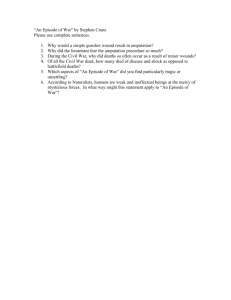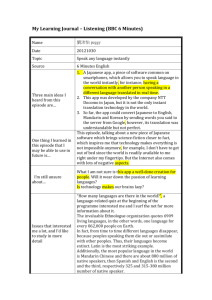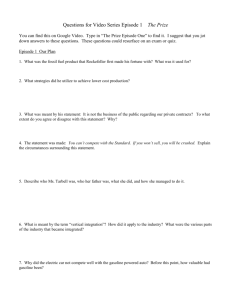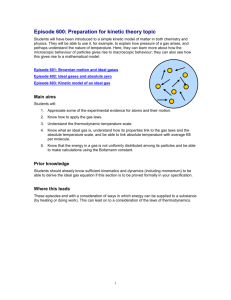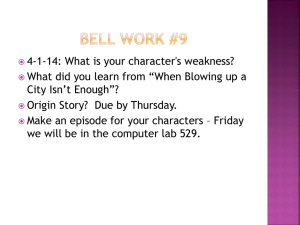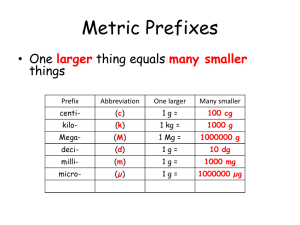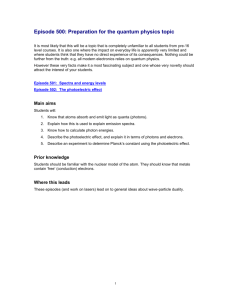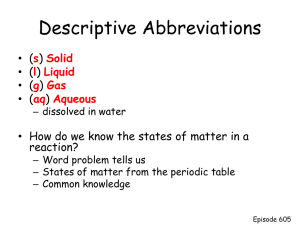My Learning Journal – Listening (BBC 6 Minutes) Name 英文二
advertisement
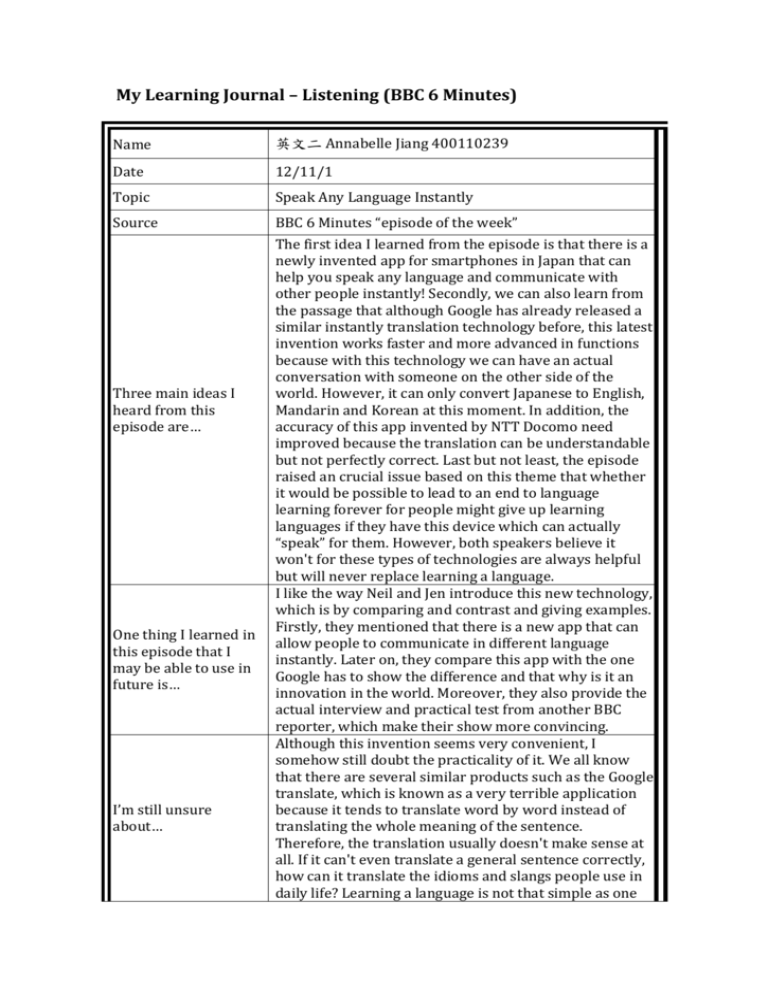
My Learning Journal – Listening (BBC 6 Minutes) Name 英文二 Annabelle Jiang 400110239 Date 12/11/1 Topic Speak Any Language Instantly Source BBC 6 Minutes “episode of the week” The first idea I learned from the episode is that there is a newly invented app for smartphones in Japan that can help you speak any language and communicate with other people instantly! Secondly, we can also learn from the passage that although Google has already released a similar instantly translation technology before, this latest invention works faster and more advanced in functions because with this technology we can have an actual conversation with someone on the other side of the world. However, it can only convert Japanese to English, Mandarin and Korean at this moment. In addition, the accuracy of this app invented by NTT Docomo need improved because the translation can be understandable but not perfectly correct. Last but not least, the episode raised an crucial issue based on this theme that whether it would be possible to lead to an end to language learning forever for people might give up learning languages if they have this device which can actually “speak” for them. However, both speakers believe it won't for these types of technologies are always helpful but will never replace learning a language. I like the way Neil and Jen introduce this new technology, which is by comparing and contrast and giving examples. Firstly, they mentioned that there is a new app that can allow people to communicate in different language instantly. Later on, they compare this app with the one Google has to show the difference and that why is it an innovation in the world. Moreover, they also provide the actual interview and practical test from another BBC reporter, which make their show more convincing. Although this invention seems very convenient, I somehow still doubt the practicality of it. We all know that there are several similar products such as the Google translate, which is known as a very terrible application because it tends to translate word by word instead of translating the whole meaning of the sentence. Therefore, the translation usually doesn't make sense at all. If it can't even translate a general sentence correctly, how can it translate the idioms and slangs people use in daily life? Learning a language is not that simple as one Three main ideas I heard from this episode are… One thing I learned in this episode that I may be able to use in future is… I’m still unsure about… thinks, so I really don't think this invention will work as it says. Issues that interested me a lot, and I’d like to study in more detail New words/phrases I learned in this episode are … I am always a big fan of learning foreign language, and till now except from Mandarin, I have already learned and will still be learning English, Japanese, and Spanish. Therefore, anything that related to learning foreign languages would appear to be very interesting to me! Although there are more and more new inventions that seem to be able to replace our acquiring a new language, I agree with Neil and Jen that it is still worth learning a foreign language all by yourself. It will truly be difficult , but you can never replace the accomplishment you obtain when really able to master the language. Just as Jen mentioned in the episode, “speaking a foreign language is one of life’s great pleasures!” 1. Sweep the world(phrase): be famous all over the world. “Is this technology going to sweep the world, I wonder?” 2. Hot on the heels(phrase): very soon after something. “Well, there are some other companies hot on the heels of the Japanese company NTT Docomo.” 3. Recap(v): to repeat the main points of something that has just been said. “Now, time for a recap of some of the words we heard in today’s programme.” Word Count 587 Comments: My Learning Journal – Listening (Academic Listening) Name 英文二 Annabelle Jiang 400110239 Date 12/11/1 Topic Introduction to English for Academic Purposes, or EAP. Source BBC Learning English-Academic Listening Three main ideas I heard from this episode are… The first idea I heard from the episode is about the situation and problems of students whose first language is not English might encounter when entering Englishspeaking universities, including understanding academic English lectures, handling different pronunciations and accents, and to express your opinions in a foreign language. Secondly, the episode introduces a special kind of English course, designed to prepare students for their studies called EAP, which stands for studying English for Academic Purposes. This means the English skills students need to actually study aboard, and by it can provide students the necessary skills to be able to manage in their studies. However, not only does a EAP course cover study skills but also social English do that students can learn general English usage as well. Last but not least, the episode later on explains different strategies for coping with study in another language by the sharing of tips from teachers and students. For example, student might find it difficult to cope with the academic nature in a foreign country such as health systems, or as Simon Williams stated, the student lack enough mental energy. He thinks it's wrong for students to pay too much attention in decoding what others are saying instead of getting the whole picture of the meaning. Therefore, it is always important to be prepared in advance. What we can do is get an EnglishEnglish dictionary, and maybe a subject dictionary, listening to the radio, and even watching TV! One thing I learned in this episode that I may be able to use in future is… I like their way they support their ideas. By stating their ideas first, then followed by the interviews of teachers and students makes what they are emphasizing clearer and more convincing. I’m still unsure about… Although I think the strategies they provide might really be helpful in improving our studies in English, I can't help but wonder whether this could also applied in other non-English countries? Issues that interested me a lot, and I’d like to study in more detail From the episode, we can find out that there are a lot of information related to Linguistic, which is a very interesting field that is worthy of exploring. There is an example from a research carried out by R. Anderson and colleagues. It illustrates that “prior information about a text” can help you to make predictions about its content and influence your interpretation. Even though it is the same story with the same words and actor, when the title of the article changes, the way how people interpret it changes too! I think this is very impressive and it reminds me of my Linguistic class. We had once discussed something similar which is a famous study by Bransford and Johnson (1972) that showed how important background knowledge was in helping people to construct meaning. We were given a demonstrative text during class and no one actually knew what it was talking about. However, when shown the title of the text, it suddenly became very easy. The teacher later explained that it was because “readers who were given the title of the passage before reading it recalled far more than those not given the title or given the title after reading.” therefore, I believe by knowing some basic knowledge of linguistic can also be helpful in our English learning. 1. Pitfall(n): a problem or difficulty that is likely to happen in a particular job, course of action, or activity. “Students and teachers will share their tips on effective learning, and give advice on some of the pitfalls to avoid.” New words/phrases I learned in this episode are … 2. Tutorial(n): a period of teaching and discussion with a tutor, especially in a British university. “ You’ll know how to structure an essay or a report, for example; and you’ll be familiar with the language used in lectures, seminars and tutorials.” 3. Grapple with something(phrasal verb): to try hard to deal with or understand something difficult. “On duty: as a student- grappling with academic ideas in academic English...” 4. Recur(v): if something, especially something bad or unpleasant, recurs, it happens again. “Get hold of some texts, perhaps over the internet, or through a library, or through journals or magazines that might be available in newsagents, or through friends, and then study recurring specialist words in those texts;” Word Count Comments: 686
